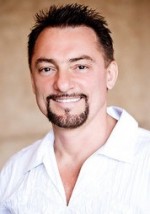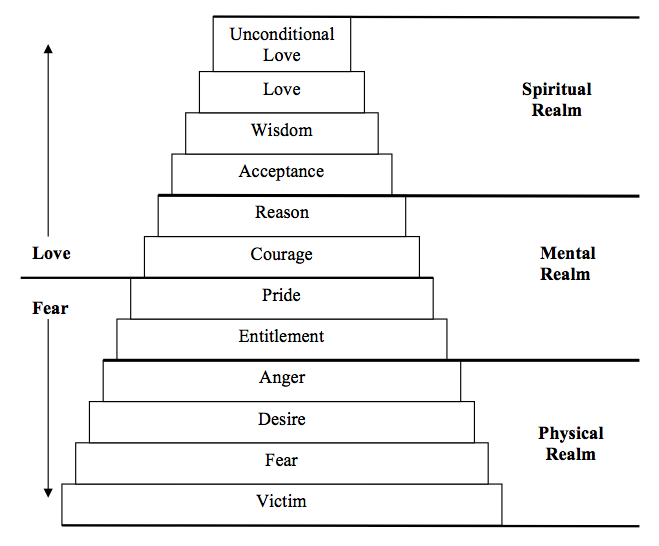The Stairway of Selves represents the totality of the human experience in 12 steps, phases, or modes.
The 12 modes are separated into three phases: the first four steps are manifestations of the physical realm, the second four are manifestations of the mental realm, and the last four are manifestations of the spiritual realm.
The Sacred Path is moving from lower levels of consciousness to the highest level possible, that being unconditional love.
Our view of the world is dependent upon our current level of consciousness; we see the world as we are, not as it is.
Fear-driven people see the world as a battlefield where exploitation and violence are the rule; love-driven people see it as an incredible playground where service and peace provide the environment.
Each of these modes of consciousness represent varying levels of power; a victim has almost no power, while a person operating from the highest level has infinite power.
Power differs from force. Force is based upon greed, manipulation, and selfishness for the few, while power is based on freedom, truth, and divinity for the whole.
Force creates counterforce and is thus in constant need of resupply; power, on the other hand, creates no counterforce. Power increases exponentially and is infinite.
The more we access the spiritual realm, the more power we have. What motivation do we have to change our mode of consciousness? Discontentment.
Rather than being something to complain about, discontentment is actually one of the most incredible gifts we have from God. Discontentment is how God gets our attention when we are doing stupid things — or things that are not useful in terms of our progression.
It is a manifestation of the love of God helping us to increase our level of consciousness and enhance our being. We move through the stages of human development by experiencing and reacting to discontentment.
Modes of the Physical Realm
When we’re living only the physical realm, everything we do is designed to experience physical sensory desire fulfillment. The way we earn money is physically. The way we enjoy ourselves is physical. The way we recreate is physically.
At the lowest mode of consciousness, victimhood, we experience poverty. The victim views life as being miserable.
Hurricane Katrina was a national tragedy that illustrated the mode of victimhood well. There were many people that knew the storm was coming, yet they chose to stay in their homes.
Why? Because on the Stairway of Selves they were on the victim stair, and the victim doesn’t have enough energy to get up and go; he doesn’t have enough power. This is not meant to vilify them; at their mode of consciousness they did their best.
Our level of consciousness determines our perspective, and our perspective in turn determines our actions.
Experiencing fear actually helps us to get out of victim mode. Had the people in New Orleans been in fear mode, they would have been afraid of the hurricane enough to get up and leave. In fear mode more power is available from which to take action.
After fear mode we enter desire. In fear mode, the life result is constant fighting; it’s the essence of the phenomenon of “fight or flight.” When we’re in fear mode, we view life as being painful and a place of suffering.
The constant fear-based fighting eventually provides enough discontentment that we seek for a higher plane. Simply wanting something better is empowering. We want to create a better life for ourselves.
What happens in desire mode is that, because there is more power available to us, at least for a short time, we experience more and better life results.
But to stay in desire mode leaves us with life results that are constantly wanting; we quickly become dissatisfied with what we have because we always want more. We find ourselves constantly saying, “I’ll be happy when…”
Rather than attracting fulfillment, this actually attracts more and more wanting, or in other words, less and less satisfaction.
In desire mode we think, “I have no money,” and the universe gives us exactly that — no money. We say, “I’d like to lose weight because I’m fat,” and the universe gives us more fat because that’s what we’re most focused on.
The signal that we send in desire mode is, “I want, I want, I want,” and the universe responds with, “Here’s more wanting.” Consequently, we end up being unfulfilled, dissatisfied, feeling incomplete.
At this point, after feeling the discontentment of dissatisfaction, we get angry; we enter the fourth and final mode of the physical realm. In anger mode, we believe that we are being punished, which results in disease.
The Chinese philosopher Lao Tzu taught that health is balance and that stress is the ingestion and creation of negative energy. Anger mode cannot last long if we want to avoid degenerative diseases.
To be continued…
*********************************
 Steve D’Annunzio is the founder of the Soul Purpose Institute, the author of The Prosperity Paradigm, and a productivity trainer and life success coach to Fortune 100 executives, professional athletes, and high-performance entrepreneurs. For twenty years, he has been helping people identify their passion, develop it into a business idea, and deliver it to the world.
Steve D’Annunzio is the founder of the Soul Purpose Institute, the author of The Prosperity Paradigm, and a productivity trainer and life success coach to Fortune 100 executives, professional athletes, and high-performance entrepreneurs. For twenty years, he has been helping people identify their passion, develop it into a business idea, and deliver it to the world.
A member of the Transformational Leadership Council, Steve has shared the stage with world-changers like Dr. Deepak Chopra, Dr. Wayne Dyer, Marianne Williamson, Jack Canfield, and Barbra-Marx Hubbard.
He uses principles of higher awareness to inspire others to be far greater versions of themselves than they ever knew to be possible. By combining scientific and spiritual truth, he co-creates inner transformations for people to experience more outer prosperity in their life.
He is an author and composer of many books, paradigms, and artistic projects that have the common theme of alleviating human suffering and enhancing joy.
Steve lives with his family in Rochester, New York.







I am one who seeks, thanks for your stairway of selves.